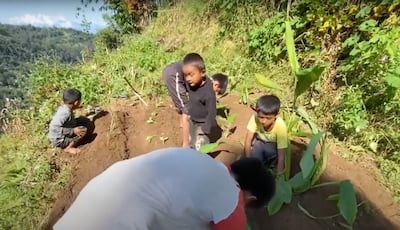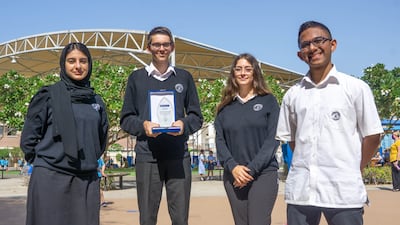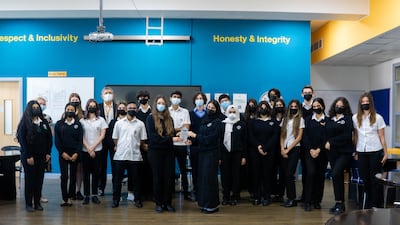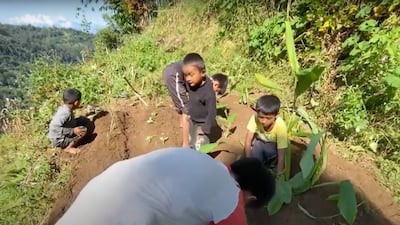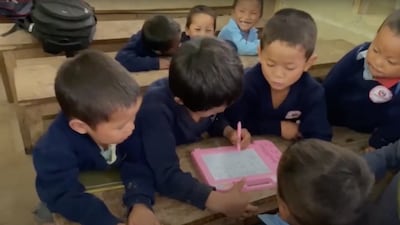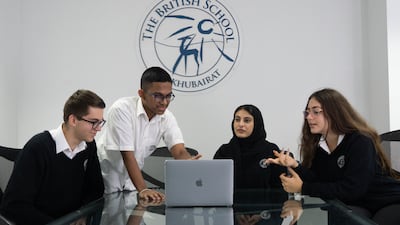Pupils at a school in Abu Dhabi helped a young orphan girl become economically independent and a village of 800 people in Nepal improve their standard of living.
For their efforts, the 22 pupils from years 11 to 13 at British School Al Khubairat won the British Schools in the Middle East's Race4Good competition.
The aim of the competition, which was open to British schools throughout the Middle East, is to improve the quality of life of the people living in Yangsijung, a rural community in Nepal that was badly affected by an earthquake in 2015.
It just shows how you don't need loads of money to make a difference in people's lives
Sam Matthews,
Year 12 pupil, British School Al Khubairat
Pupils worked their way through a series of challenges, communicated with elders in the community in Yangsijung and developed ideas to help them.
The Abu Dhabi school's winning solutions were implemented in the village within days.
Each child who participated in the competition paid Dh350 to take part. In total, they were given a budget of just under Dh3,000 (£600) for the three-week competition, which started at the end of September.
Sam Matthews, 17, a Year 12 British pupil at the school who participated in the event, said: “Having won the competition, it just shows how you don't need loads of money to make a difference in people's lives.
“It took us three weeks and we were able to change 800 people's lives for years to come."
Improved quality of life
As a part of the competition, the pupils had to come up with a solution to improve the quality of life of Kipa, 18, who was orphaned at the age of 13.
The pupils bought Kipa a goat and chickens so that she could sell eggs and milk and increase her income.
They also helped by renovating her house, which had been damaged by the earthquake.
Dimitra Karachaliou, 16, a Greek Year 12 pupil at the school, said they received a rundown of her daily life, how much money Kipa spent every month and where she worked.
"From that, we tried to find a way to economically uplift her. For her housing, we tried to make that better for her. We tried to give her a better job to provide her with more money," Dimitra said.
A Race4Good worker in Nepal helped to bring the pupil's plans to life and sent videos of their concepts being put into place.
For the education challenge, they realised that pupils did not have anything proper to write on and that their classrooms were very cold in the winter.
The pupils provided them with sticky-back plastic that could be stuck on their desks so they could be wiped clean and used repeatedly.
They also donated whiteboards and erasers so they could work at their desks.
To keep the classrooms warm in the winter, they came up with a solution to insulate the classroom with cardboard and tin foil, and then paint the bricks black, which gives them better heat absorption.
Dasnula Ratnayake, 16, a Year 12 Sri Lankan pupil at the school who worked on the project, said: “It was very heart-warming and emotional to see the videos, and when we did see the end result, it was thrilling for us.
"We could see children helping out – planting the herbs and spices – and see that eventually, down the line, this is going to have a massive impact on the community.
“This cannot be taught through a textbook or in a classroom. It needs to be done for you to learn from it."
Sustainable solutions
During the final round of the competition, the pupils had to find sustainable solutions to raise the standard of living for the entire village, which is in a remote area of Nepal.
The team provided herbs and spices because these are in high demand and could be grown and sold in the area for a considerable profit.
After discussions with community elders, the team also bought coffee seeds, with the long-term plan of selling these for a profit in the future.
Alreem Al Ahbabi, 17, a Year 12 Emirati pupil at the school, said: "Although we had a tiny amount of time to make these challenges, we had to find a way to solve really big problems, such as in education, where we helped improve a school, and uplifting the health care, where we implemented midwifery."
On Wednesday, Dr Amir Jafri, Race4Good chief executive, visited British School Al Khubairat to give the prize to the pupils.
UAE - India ties
The UAE is India’s third-largest trade partner after the US and China
Annual bilateral trade between India and the UAE has crossed US$ 60 billion
The UAE is the fourth-largest exporter of crude oil for India
Indians comprise the largest community with 3.3 million residents in the UAE
Indian Prime Minister Narendra Modi first visited the UAE in August 2015
His visit on August 23-24 will be the third in four years
Sheikh Mohamed bin Zayed, Crown Prince of Abu Dhabi and Deputy Supreme Commander of the Armed Forces, visited India in February 2016
Sheikh Mohamed was the chief guest at India’s Republic Day celebrations in January 2017
Modi will visit Bahrain on August 24-25
MATCH DETAILS
Juventus 2 (Bonucci 36, Ronaldo 90 6)
Genoa 1 (Kouame 40)
Courses%20at%20Istituto%20Marangoni%2C%20Dubai
%3Cp%3E%3Cstrong%3EUndergraduate%20courses%3C%2Fstrong%3E%3Cbr%3EInterior%20Design%3B%20Product%20Design%3B%20Visual%20Design%3B%20Fashion%20Design%20%26amp%3B%20Accessories%3B%20Fashion%20Styling%20%26amp%3B%20Creative%20Direction%3B%20Fashion%20Business%3B%20Foundation%20in%20Fashion%3B%20Foundation%20in%20Design%3Cbr%3E%3Cstrong%3EProfessional%20courses%3C%2Fstrong%3E%3Cbr%3EFashion%20e-Commerce%20%26amp%3B%20Digital%20Marketing%3B%20Fashion%20Entrepreneurship%3B%20Fashion%20Luxury%20Retail%20and%20Visual%20Merchandising%3Cbr%3E%3Cstrong%3EShort%20courses%3C%2Fstrong%3E%3Cbr%3EFashion%20design%3B%20Fashion%20Image%20%26amp%3B%20Styling%3B%20Fashion%20Trend%20Forecasting%3B%20Interior%20Design%3B%20Digital%20Art%20in%20Fashion%3Cbr%3EMore%20information%20is%20at%20%3Ca%20href%3D%22https%3A%2F%2Fwww.istitutomarangoni.com%2Fen%3Futm_source%3DLocal%26utm_medium%3Dorganic%26utm_campaign%3Dgmb%26utm_content%3Ddubai%22%20target%3D%22_self%22%3Ewww.istitutomarangoni.com%3C%2Fa%3E%3C%2Fp%3E%0A
2018 ICC World Twenty20 Asian Western Sub Regional Qualifier
Event info: The tournament in Kuwait is the first phase of the qualifying process for sides from Asia for the 2020 World T20 in Australia. The UAE must finish within the top three teams out of the six at the competition to advance to the Asia regional finals. Success at regional finals would mean progression to the World T20 Qualifier.
Teams: UAE, Bahrain, Saudi Arabia, Kuwait, Maldives, Qatar
Friday fixtures: 9.30am (UAE time) - Kuwait v Maldives, Qatar v UAE; 3pm - Saudi Arabia v Bahrain
AUSTRALIA SQUAD
Tim Paine (captain), Sean Abbott, Pat Cummins, Cameron Green, Marcus Harris, Josh Hazlewood, Travis Head, Moises Henriques, Marnus Labuschagne, Nathan Lyon, Michael Neser, James Pattinson, Will Pucovski, Steve Smith, Mitchell Starc, Mitchell Swepson, Matthew Wade, David Warner
UNpaid bills:
Countries with largest unpaid bill for UN budget in 2019
USA – $1.055 billion
Brazil – $143 million
Argentina – $52 million
Mexico – $36 million
Iran – $27 million
Israel – $18 million
Venezuela – $17 million
Korea – $10 million
Countries with largest unpaid bill for UN peacekeeping operations in 2019
USA – $2.38 billion
Brazil – $287 million
Spain – $110 million
France – $103 million
Ukraine – $100 million
Top financial tips for graduates
Araminta Robertson, of the Financially Mint blog, shares her financial advice for university leavers:
1. Build digital or technical skills: After graduation, people can find it extremely hard to find jobs. From programming to digital marketing, your early twenties are for building skills. Future employers will want people with tech skills.
2. Side hustle: At 16, I lived in a village and started teaching online, as well as doing work as a virtual assistant and marketer. There are six skills you can use online: translation; teaching; programming; digital marketing; design and writing. If you master two, you’ll always be able to make money.
3. Networking: Knowing how to make connections is extremely useful. Use LinkedIn to find people who have the job you want, connect and ask to meet for coffee. Ask how they did it and if they know anyone who can help you. I secured quite a few clients this way.
4. Pay yourself first: The minute you receive any income, put about 15 per cent aside into a savings account you won’t touch, to go towards your emergency fund or to start investing. I do 20 per cent. It helped me start saving immediately.

